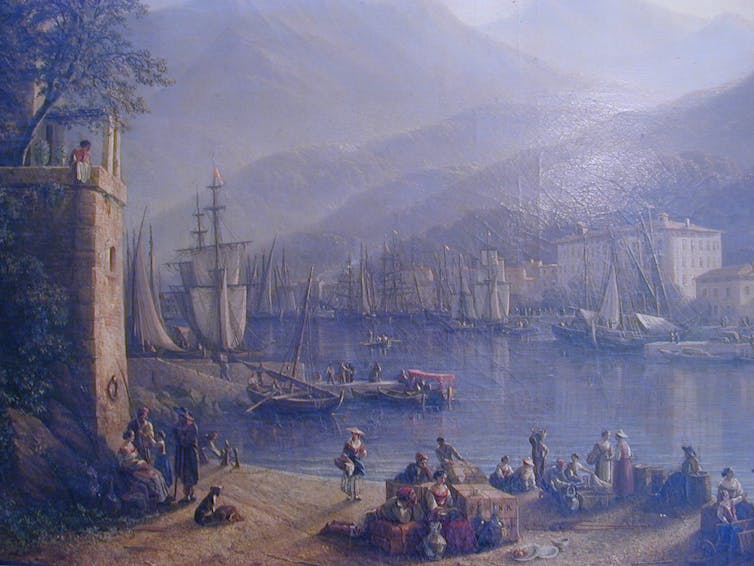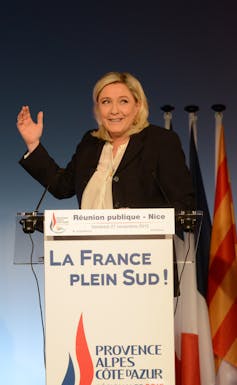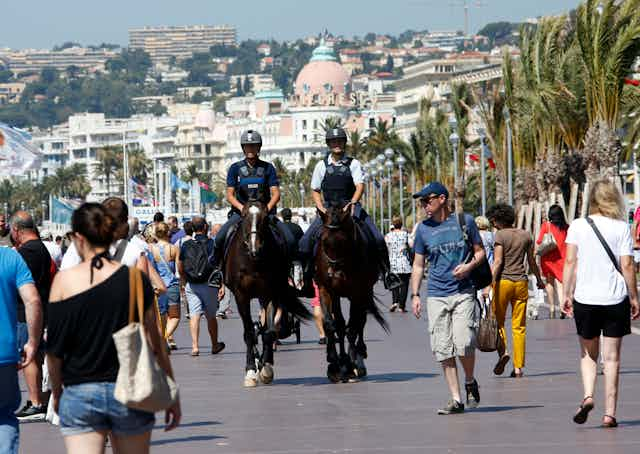A little over a week ago, I flew out of Ataturk Airport in Istanbul and narrowly missed the attacks that left more than 40 dead and hundreds injured. Other acts have followed: Baghdad, Dhaka, Medina.
Now the city of Nice reels in shock after a truck plowed through the crowds celebrating Bastille Day.
It is the third major attack against France in the past two years. Young and old, men, women and children, Muslims, Christians, Jews, people of every religion, and those with none at all, were gathered to watch the fireworks on the Promenade des Anglais. The famous thoroughfare winding along the shore of the Mediterranean is now stained with blood and destruction.
We can’t know what went through the mind of such a killer.
Early reports point to a petty criminal past, domestic violence, a broken marriage, an explosive sense of personal grievance.
But what sets the spark to this Molotov cocktail of aggression? Sociologist Olivier Roy has argued that this is not a radicalization of Islam, but rather an “Islamization of radicalism”. It’s a controversial thesis, but in this case it seems he may well be right.
There is little evidence that this man even practiced his religion, let alone that he was willing to kill and die for it. Yet he tore apart his own life along with those of hundreds of people he had never met, not on the battlefields of Syria or Iraq but on the manicured esplanade of Nice.
Nice, however, is not just a holiday destination. It is a city that bears deep scars from France’s colonial past. It is impossible to know what role they play in the motivation of an individual. But it’s clear that a sense of social grievance can fuel radicalization, whether linked to Islam, to extreme right-wing ideology, or to racial politics, as we’ve seen recently in the United States.
More than a decade ago, when I arrived in France to research my history of its first Arab migrants, Nice was the first stop I reached on the train from Rome. It is an elegant and striking city, set against the azure Mediterranean. My work since then has opened my eyes to the history and politics behind the waving palms.
The other side of the postcard
On 14 July 1789, when the people of Paris stormed the royal castle of the Bastille, Nice was part of the Kingdom of Sardinia, not yet in France. Yet many of those living in the city were already inspired by the ideas and actions of the Revolution, like one of Nice’s most famous sons, the Italian revolutionary Giuseppe Garibaldi.
Three years later, the armies of the Revolution advanced into Italy, and Nice voted en masse to join the French Republic, only to leave again in 1814.

It was not until 1860 that Nice would become a permanent part of France, thirty years after France invaded and occupied Algeria. In the Second World War the region was occupied by Italy, and Nice became a refuge for Jews fleeing persecution in Vichy France, allied with Nazi Germany. When the Germans seized the city in 1943, they deported thousands of Jews to be murdered in occupied Poland.
When France’s 132 year colonial history in North Africa came to an end in 1962, more than a million people left Algeria, and others left Tunisia and Morocco to “return” to a France that was not their home.
Among them were Europeans of different origins, many North African Jews, and Muslims who had fought for the French in Africa. They were joined in the three decades that followed by 700,000 Algerian Muslims, drawn by the economic boom in France’s thirty glorious years after 1945.
Economist Thomas Piketty has identified this postwar period as one of exceptional growth in wealth but also in increasing equality through progressive taxation and public programs.
When that period suddenly came to an end in the 1970s, it left a population still divided by race, religion and old resentments, now exacerbated by economic woes.
Along with the far north, the “Midi”, as the southern part of France is known, felt the downturn particularly sharply, with unemployment over 11.4% for more than a decade after 1975.
Bad memories of a colonial past
In many ways, France’s Mediterranean coast has remained an implanted colonial world. Marseille became the “Arab” city whose inner suburbs were dirty and above all poor, while Toulon and Nice became bastions of the pieds-noirs, the former white residents of North Africa, with low-cost housing far from the centre.
In colonial Algeria, Tunisia and Morocco, Muslims could not become French citizens without renouncing their Muslim status. Only a tiny number ever succeeded in gaining that privilege.
In France Muslims could obtain citizenship, but invisible barriers have continued to keep many from full participation in society. Recent studies have demonstrated that Muslims face constant discrimination in the job market. France has failed to deliver on the promise of its national motto of Liberty, Equality, Fraternity.
The pieds-noirs felt abandoned too. They felt blamed for a colonial enterprise France wanted to forget. They believed they were targeted for a racism that other French people preferred not to recognize in themselves. One 2006 study found that 44% of pieds-noirs surveyed had voted for the nationalist Front National (FN) in the past.

Indeed, they have been a stronghold for the rise of the extreme right in French politics. They voted for the FN in spite -— or because of -— its racist, anti-Semitic, anti-Muslim rhetoric. But now mainstream parties are grabbing these voters back by adopting the same tone.
Elsewhere in France racism dare not speak its name. In Nice, it is out in public for all to see. The president of the Nice region and former mayor, Christian Estrosi, for example, has questioned the right of those born in France to receive automatic citizenship. He has called Muslims a “fifth column” and described some immigrants as French “only on paper.”
In the struggles to dominate French politics, these right-wing voters are now a prized constituency. With that has come a new celebration of the brutal colonial past.
In 2012, a monument to “all the French from the other shore” (in other words, North Africa) was unveiled on the Promenade des Anglais. A block of granite torn in two leaving a jagged rupture: this was a monument that recognized only one side of the colonial experience. Estrosi reportedly closed his speech by declaring “Long live French Algeria.” Only in Nice could such a celebration of division be given the sanction of the Republic by the mayor.
Even before the blood has been cleaned from the sidewalks of the Nice waterfront, politicians in the U.S., France and elsewhere are, it seems, scrambling to make political capital from this tragedy. They want us to see things in black and white, and only from one side. They would like to turn against Muslims — who are also victims of this violence - by blaming Islam. This overreaction is exactly what groups like ISIS are hoping for. As their territory shrinks, hatred is their gateway to a virtual new world.
This is a struggle against all of those who want to crush the dream of an open society, the values of freedom and equality that French revolutionaries struggled for. Fear and hate are their stock in trade.
We cannot prevent this violence. But we can stand firm, refuse to hate, and defend our common humanity.

